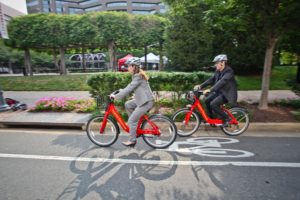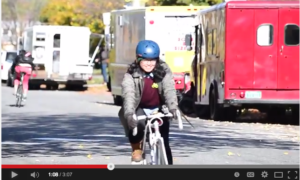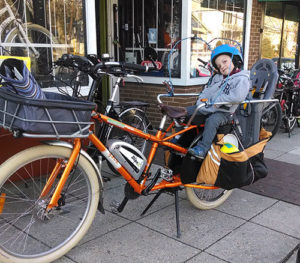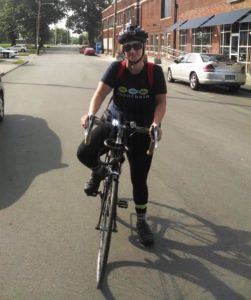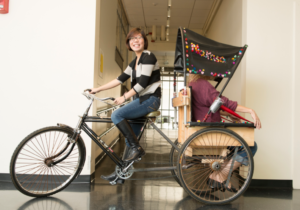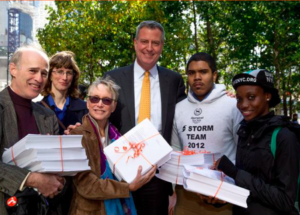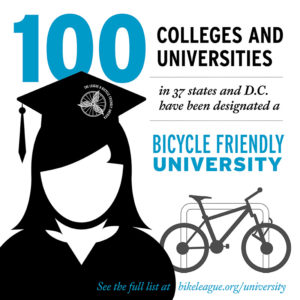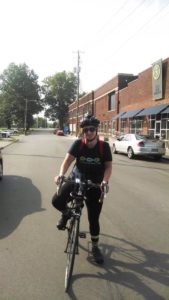Blog
Under current law people who drive to work get almost twice the parking benefit as transit riders get for transit. It’s time for Congress to respect ALL commuters. Starting this past January, transit benefits slipped from $245 a month to $130, and parking benefits increased from $245 to $250. Meanwhile, the bike benefit stayed at $20 a month — but under a current bill in the U.S. House of Representatives, the bike benefit would be repealed all together.
Read More →If all you read was the press release of a new report by the Governors Highway Safety Association (GHSA), “Bicyclist Safety,” you would be forgiven if your take-away was: More bicyclists are being killed on American roads but they’re mostly helmet-less drunks — and there aren’t enough deaths to make it a national issue anyway. The tone-deaf press release focuses on the share of fatalities of helmet-less riders and those with a high blood-alcohol level, without a single mention of speeding or driving behavior, and only a passing reference to Complete Streets.
Read More →At the University of Vermont, the word “BUG” has a whole new meaning. Last week, we announced our latest round of Bicycle Friendly Universities, including the University of Vermont, a new Silver-level BFU. Vermont advanced from Bronze this round, and the program now has 100 BFUs in 37 states and Washington, D.C.
Read More →Electric bikes are undeniably part of a future in which bicycles are a common transportation solution for all types of people. As members of the League, or people interested in bicycling, you have a wealth of bicycling experience that’s important to our efforts in effectively integrating these new vehicles into our laws, infrastructure and culture. Please help us by completing our survey and sharing your thoughts.
Read More →Earlier this week, Steve Clark gave a powerful first-hand account of riding with Cherokee Schill in the exurbs of Lexington, Ky., putting a real human face on the sometimes abstract concept of bicyclists’ rights. Ken McLeod followed up with a deep dive into the legislative and regulatory environment that make her case challenging and somewhat unique — thank you, the Commonwealth of Kentucky.
Read More →This week, my colleague, Steve Clark, wrote about his experience riding with Cherokee Schill and the conditions she faces while biking to work in Kentucky. Her fight for her right to road reflects our society’s decisions about how we create roads, how we create laws for those roads, and the culture of safety we choose to create for our roadways. So what’s the legal background for her fight? And are their signs of hope for Kentucky’s future? Keep reading…
Read More →Access and safety are top priorities for the institute in promoting cycling. Infrastructure around the MIT campus supports safe cycling for MIT and its neighbors through the integration of a cycle track and bike lanes that connect with the surrounding Cambridge community. There are eight bicycle fix‐it stations around campus that ensure quick access to tools for commuters and cyclists on the go. For community members without a bicycle, the annual MIT Bike Auction provides a low‐cost purchasing option to encourage bike ridership. The auction also provides a recycling mechanism for discarded bikes on campus.
Read More →Last week, the Congressional Bike Caucus hosted a briefing for Congressional staffers to discuss what’s next for bicycling and walking safety — and the event was standing room only. Many Congressional staffers were supportive of HR 3494, The Bicycle and Pedestrian Safety Act, and are interested in learning what’s coming next.
Read More →Today, on Campus Sustainability Day, the League of American Bicyclists announced 33 new and renewing Bicycle Friendly Universities (BFU) in 20 states. With this new round, 9 of the to 10 colleges and universities in the country, according to the 2014 U.S. News & World Report ranking, are Bicycle Friendly Universities. These institutions join a cutting-edge group of colleges and universities from across the United States transforming their campuses and the communities around them. There are now a total of 100 BFUs in 37 states and Washington, D.C.
Read More →I used to think I was about as fearless and empowered as any cyclist out there. Then I rode with Cherokee Schill. When I was in Lexington, Kentucky recently for a Bicycle Friendly Community visit, I rode with Schill, a woman who’s been ticketed and even jailed for biking to work in the travel lane, rather than the shoulder, of a busy state highway.
Read More →